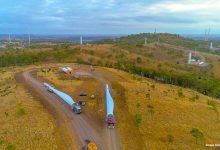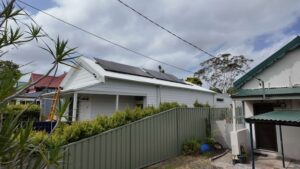The first electricity generation has been achieved at AGL’s Coopers Gap wind farm, located to the north-west of Brisbane, which is set to take the mantle of Australia’s largest wind farm when fully commissioned.
Electricity from the first two turbines was fed into the National Energy Market on Thursday, with a total of 123 turbines to be installed at Coopers Gap wind farm, with a combined generation capacity of 453MW.
It will become Australia’s largest wind farm by operating capacity when the final turbine is commissioned, expected in the second half of 2019, and is using turbines supplied by GE, which are also among the largest deployed in Australia.
The project highlights the divergent approach to energy developments in Queensland, with the government enthusiastically welcoming approvals for the Adani Carmichael Coal Mine, while the state becomes home to Australia’s largest non-hydro renewable energy project.
AGL has also proposed to integrate a big battery system at the Cooper’s Gap site, with AGL CEO Brett Redman telling RenewEconomy’s Insiders podcast that the company had plans for a 100MW/150MWh battery system at the site.
AGL had submitted the battery proposal for consideration under the Federal government’s Underwriting New Generation Investments program but was not shortlisted after the government eschewed proposals from the major utilities.
AGL’s retail arm will purchase both energy and renewable energy certificates produced by the wind farm for a bundled price of less than $60 per MWh for the first five years
The Coopers Gap Wind Farm is 250 km north-west of Brisbane and will be located on land used for cattle grazing. The wind farm will produce more than 1.5 million MWhs of generation annually, enough power to supply around 264,000 homes.
AGL CEO Brett Redman welcomed the milestone, saying that it is a crucial moment in the Australian energy market to have a project of Coopers Gap’s scale nearing completion.
“The size and scale of a project like this is extraordinary, and today’s milestone is thanks to the hard work of so many people,” Redman said.
“This is a significant project for AGL and the timing of bringing new generation into the grid is crucial for all energy users.
“It’s another great example of our commitment to investing in new generation to deliver affordable and reliable power for customers.
“We appreciate the support we have received from Government agencies in Queensland to navigate the logistic issues experienced during construction.”
AGL was keen to highlight the level of local investment that the project has generated for Queensland townships around the wind farm, estimating that as much as $56 million has been spent purchasing products and services from local businesses.
“I’d also like to recognise the efforts of the Australian Energy Market Operator and Powerlink as project partners who helped us get here, along with the support of the local community and local councils,” AGL General Manager of Gas and Renewables Operations, Colin Mills, said.
The wind turbines used at the Coopers Gap wind farm will use blades that measure 67 metres in length, the largest used in Australia, and so requiring specialised logistics to transport the blades to the site.
GE has supplied the project with 91 of its 3.6MW turbines with 137m rotors, and 32 of its 3.8 MW turbines with 130m rotors.
The project was developed by AGL and will be owned by the company’s Powering Australia Renewables Fund (PARF), which was co-created with QIC. The fund has set an investment target of 1,000MW of large-scale renewable energy projects in Australia.
The PARF has also received investment from the Federal Government’s Future Fund.
AGL has sought to expand its investments in long-term assets, including diversifying its business interests beyond the energy sector.
Earlier in the month, AGL abandoned a take-over bid for telecommunications company Vocus Group, as the energy giant see opportunities to align data and energy services as a way of improving offerings to customers and improving customer loyalty.








